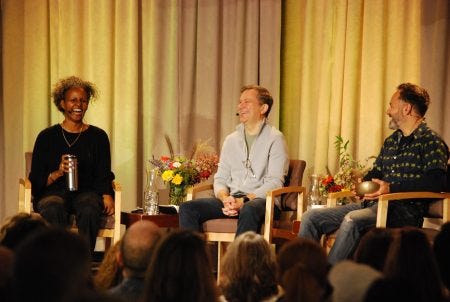"Having ADHD is like being the smartest, stupidest, most motivated and laziest person in the room — all at the same time." — Comiendo Piscocho, quoted in Jessica McCabe's "How to ADHD"
I could write a book on the subject of ADHD and meditation. Actually, I’ve already written a book on it. A mad book, exploded across my hard drive and on scraps of paper and in various journals and scribbly book marginalia and loopy digressive text messages to Sarah and — at latest count — about a dozen abandoned Word documents splattered with bullet points.
In case you couldn’t tell already, I am ADHD — with a proper ADHD diagnosis, thank you very much. And because understanding ADHD is so important to me, the frazzled overwhelm of trying to do the subject justice keeps continually defeating me (for a video of exactly this happening in real time, click here).
Despite its many gifts and strengths – and I will have much to say about these – I have found ADHD to be hard.
There’s research showing the average ADHD adult will live 13 years less than the average non-ADHD adult. Thirteen years. That’s not just a bit of distractibility — that’s a public health crisis.
Why such a huge toll?
In part because many ADHDers have difficulty with long-term, goal-directed behaviors. It can be hard to maintain healthy habits. Meditation, diet, structure, sleep, employment, relationships, sobriety … you* know there are reasonable things you should be doing in these areas of life, but implementing and staying with these reasonable things can feel impossible. (*see footnote:1)
The doomed sense of not being able to help yourself is brutal. It can paralyze you even further. The very thing that should be helping you — your mind — is the very thing that’s messing you up. Around and around you go, in a spin-cycle of thwarted motivation and self-directed despair.
To my ADHD friends who relate to this: I feel you.
I still live this, every day. And, I’ve come to see ADHD as a very workable condition. Education, medication, lifestyle modifications and accommodations … all can help.
So can meditation and practice. They can help shave off suffering and reactivity from our situations, so we can fly our freak flags even higher. Screw thirteen years less! I plan to live to 100, and I’m taking you fuckers with me.
Today’s meditation is a bit different. For one … it’s not that relaxing! I talk a lot. I deliberately name some ADHD-related struggles, both how they feel for me, and how I work with those feelings in the moment. My intention is to help you recognize whether some of this may also be happening for you. Clearly seeing the ways that we struggle is the beginning of addressing those struggles.
In the months to come, I’ll be publishing ADHD-themed posts and meditations on a variety of topics, including how we can experience many of these same ADHD-related quirks in a way that’s affirming and empowering. Other subjects include: gradual transitions, realistic self-regulation, movement meditation, heightened sensitivity, “spiral time,” niche construction and communication, holding our identities lightly, and the neurodivergent journey in general.
You don’t need to be ADHD to do these meditations, because the challenges of ADHD are relatable to many people. They may also help build compassion and understanding for any ADHDers in your life (about 6% of adults worldwide, and 14% of children).
One more (mystical) thing: meditation has helped me recognize that the awareness that knows my ADHD-ness … itself isn’t ADHD. It’s just space. To use a bit of Buddhist-speak, awareness is “empty” of all objective qualities, and that includes anything connected to our personal identities. Whatever you may think of this as a concept, it is also an experience, and a wonderfully freeing one at that. So: we will also travel here, to the far shores of common sense. Hooray!
Much love to all humans — especially you magical weird ones.
Jeff
PS - I want to thank the meditation apps Calm and Ten Percent Happier for providing a space for some of my first experiments in writing meditations for ADHD folks. Both have been very accommodating of my neurodivergent working style. Calm also connected me to an amazing clinical psychologist (and ADHD specialist) named Dr. Alise Conner – together we developed "The ADHD Support Series" for Calm.
THIS WEEK ON THE MIND BOD ADVENTURE POD
Finding Home in Our Skin with Kaira Jewel Lingo
Welcome Kaira Jewel Lingo, author of We Were Made for These Times and coauthor of Healing Our Way Home. Kaira shares her journey from a communal upbringing and monastic life with Thich Nhat Hanh, her work in nurturing community, and her exploration of racial identity in spiritual practice.
Her gentle guided practice is beautiful and completely original. We notice the experience of our skin - its age, its protective and permeable nature, its colour, and its history. Afterwards, Tasha shares how profound this was for her, feeling her mixed white and Black heritage, which at times can feel like a battlefield playing out on her own skin.
MEDITATION PARTY - In-person and online retreat
October 11 - 13, 2024
Omega Institute, Rhinebeck, NY
Mindfulness, Conversation, and Reckless Conviviality with Meditation Superfriends Dan, Seb and Jeff
Join us for a three-day, do-nothing party with Sebene Selassie, Jeff Warren, and Dan Harris. We’ll do lots of meditating, but this is definitely not a silent retreat. We’ll also be connecting with each other, moving our bodies, and discovering the power of applying our practice to everything in life.
Many of us meditate solo these days. This is a chance to get all of the HOV lane benefits of meditating in a group. Come if you’re a beginner or a seasoned practitioner looking to up your game. Seb, Jeff, and Dan teach meditation from very different perspectives, and our goal is to help you explore a variety of techniques, both for on-the-cushion practice and free-range living.
Have a meditation request?
Great – please fill out this form. Write (brief) context about you and your situation, including what’s helped in the past, or where your curiosity comes from. Although I can’t respond to all requests, the act of simply stating a situation – and naming what’s already been supportive – can be clarifying and helpful.
Once a month, I choose one question, and write both a response and a meditation. These make up Hey Jeff, a column available to paid subscribers.
Thank you.
Some ADHD readers may bristle at my “you” generalizations; others I hope will feel validated and seen. Everyone's experience of ADHD is different, and different practices work for different people. My observations are based on a combination of personal experience, conversations with other ADHDers, and years of rigorously unsystematic research. I’m extremely curious about other ADHDers – both their unique experiences, and what practices they’ve found supportive. If inspired, please share in the comments!
















